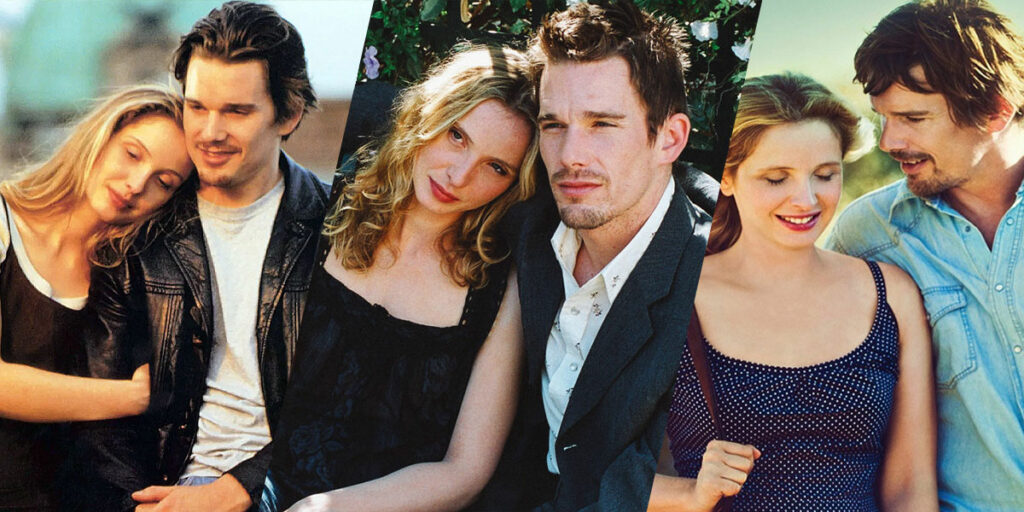Richard Linklater’s trilogy of Before Sunrise, Before Sunset, and Before Midnight tells the heartfelt, surprising tale of the joys and pains of modern love.
It’s February, which is home to one of the most celebrated holidays of the year. That’s right … Presidents’ Day! Oh, and I guess Valentine’s Day too, which means it’s as good a time as any to whip out your favorite romantic films or discover new ones. And for many, three movies collectively make up one of the greatest romance stories in film: the Before trilogy, consisting of 1995’s Before Sunrise, 2004’s Before Sunset, and 2013’s Before Midnight.
Directed and co-written by Richard Linklater, the Before trilogy tells an intricate, 18-year-long tale of Jesse (Ethan Hawke) and Céline (Julie Delpy). Jesse, an American on a train to Vienna to catch a flight home, meets Céline as she returns to her home in Paris on the same train. The two hit it off very quickly and decide to spend that whole day and night together in Vienna before Jesse’s flight. But what was meant to be a one-night experience ends up following them years later as they exit and re-enter each other’s lives, leading to unforgettable experiences, complications, and an exploration of their impact on each other and their perceptions of love, for better and for worse.
I didn’t see the Before trilogy as each entry came out, rather watching all three of them for the first time over the course of a few weeks. And while the overall story took time to grow on me, by the time I was finished with them, I was riveted by these two characters and how their relationship evolves over so many years. Simply summing them up so briefly might make you think there couldn’t be enough rich material for three whole films, especially when the time gap between each one is nine years.
But the Before trilogy constantly keeps you guessing and subverts your expectations in ways that are jarring in the moment but make perfect sense when you have the whole picture. Plus, it’s one of the very rare film trilogies that, for me at least, improves with each entry. Which means you can consider this a ranking of the films from worst to best if you want. I’ll be going through each film chronologically and giving my thoughts on them individually, how they compare to the others, how the writing evolves, and how the overall story progresses and gets recontextualized as the movies go along!
Also, I’ll keep out most spoilers for each movie as I talk about it, but naturally I’ll have to give away major details of Before Sunrise and Before Sunset when I talk about their follow-ups.
BEFORE SUNRISE
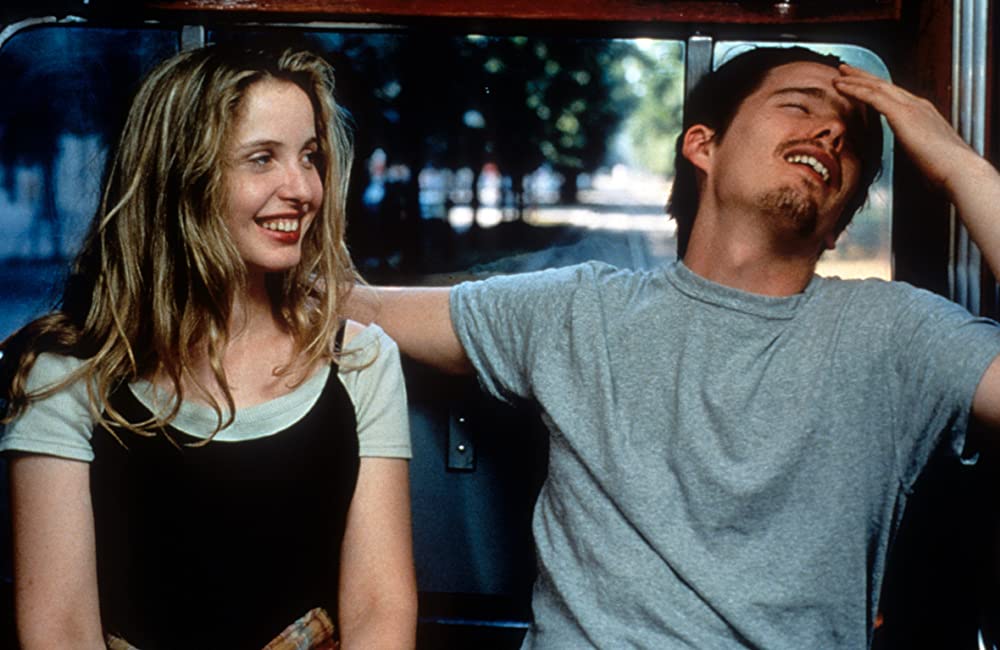
With the praise I’ve just given this trilogy, you might be surprised by a rather unpopular opinion of mine: I don’t care much for Before Sunrise. I don’t think it’s bad by any means, but it’s the film where the script and story flow easily could have used the most polishing. Like I said, Before Sunrise kicks the whole Before trilogy off when Jesse and Céline meet in Vienna. From there, pretty much the entire movie is them just roaming around the city.
As their seemingly short-lived romance blooms, they talk about themselves, their growing connection to each other, and their outlooks on love and life in general. The film, like its successors, is very light on plot and almost exclusively a dialogue-heavy character study. I can imagine people being hesitant to check it out because of this, let alone two more movies of the same nature. But clearly Before Sunrise won over almost everyone, and I can see why.
All of the conversations, on their own, are thought-provoking and meaningful, and each one peels back the layers of these characters to make them as fleshed out as possible. The chemistry between Hawke and Delpy is beyond spectacular, giving Before Sunrise the heart and soul that it otherwise would have sorely lacked. I thoroughly buy that they genuinely care for and are attracted to one another so quickly, enough for me to want to see them find some way to make a relationship possible.
It’s especially interesting to look back on their chemistry after seeing the whole trilogy, comparing their young, hopelessly romantic selves to what they end up becoming. Instead of trying to force a more conventional narrative or portray some artificial fairytale relationship, Before Sunrise cuts out all of the romantic clichés you’ve probably seen before through its raw honesty and in-depth analyses of love, how it’s perceived, and how it’s evolved to where it was at the time of the film’s release. Relying so heavily on interactions and experiences is always risky for a film, and I admire such efforts and vision.
The execution of those attempts is what drags Before Sunrise down for me. This film has some great individual scenes, but they don’t fare as well when they’re stitched together the way they are here. The main problem is that the dialogue, while very insightful, is excessively poetic and overwrought. A lot of what our main characters say comes across less like the genuine musings of two fully fleshed-out, real people, and more like Linklater using the characters as mere mouthpieces for his own philosophical musings.
Clearly most writers are going to inject their own viewpoints into their characters, but the translation to a screenplay needs to not have those viewpoints feel written. True, there are a lot of complex, heavy ideas being discussed by the characters themselves, so it makes sense that their speech would often be heightened. But that’s pretty much all we’re hearing from them, and the delivery is often so heavy-handed and long-winded that the authenticity really takes a hit.
The later films in the trilogy would use much more discipline to make these in-depth conversations feel believable. But in Before Sunrise, there’s no restraint or casualness whatsoever, which hurts the film more than it helps and even makes it a little laborious to sit through. But does that mean I wouldn’t recommend sitting through it at all? Not quite. Not only am I clearly in the minority here, but the film is still a fine enough watch for what it does right. I don’t dislike Before Sunrise; I just have very middling feelings towards it on its own. But it was more than worth seeing for how it sets up the much more polished sequels to come.
BEFORE SUNSET
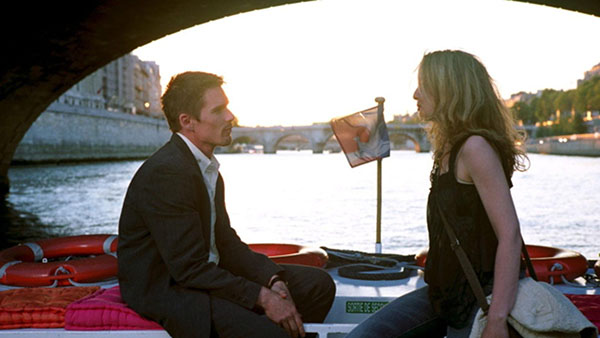
Before Sunrise ends with our couple agreeing to meet in Vienna again in six months. Well, in Before Sunset, it’s nine years later and we see whether they made good on that promise and what their lives are like now. Jesse has written a bestselling book based on their time together and is doing a reading in Paris. Céline attends the reading, and it’s revealed that this is their first meeting since that fateful night in Vienna. Like in Before Sunrise, the two again spend most of the film talking about themselves and their passions as they roam around a glamorous city. Except this time, a lot of the regrets and unhappiness in their lives come to the surface, forcing them to make complicated choices before Jesse’s flight back home.
Before Sunset, to me, is where the Before trilogy really hits its stride, with by far the biggest improvement being the screenplay. Delpy and Hawke co-wrote the film alongside Linklater this time, and that extra help really shows. Though there’s still some overly-philosophical dialogue here, it’s far wittier and feels a lot more real, not feeling like it’s going out of its way to make some big, whimsical statement nearly as often.
You can also see the growth in both Jesse and Céline after so much time has passed, and the time they spent apart allows for much more focused drama when these two would-be lovers meet up again. They both have richer histories and deeper experiences now, which are unveiled as the film plays out, including the fact that Jesse is married with a kid. This allows for much more profound conversations that are about them, not just their beliefs. In fact, you could argue in hindsight that their overblown speeches in Before Sunrise actually benefit this film by highlighting how much their perspectives have changed.
There is still an issue that carries over from Before Sunrise, but it’s only when watching Before Sunset that I noticed it. These first two films, despite having very little plot, rarely know when to take a breath when it comes to the conversations. The median length of pauses between dialogue in this movie feels like one second, and the transitions between conversation topics and spaces between exchanges are so quick that I don’t buy the spontaneity of what these characters are saying. The conversations feel too rehearsed because they’re flying by too quickly for how layered and in-depth they are.
That’s why the final twenty-minute stretch is by far my favorite portion of Before Sunset, and maybe of the entire trilogy. It starts with thirty seconds of pure, uncomfortable silence as Jesse and Céline walk up to the latter’s apartment, followed by a very touching, slowly-building sequence that finally lets them truly soak in their time together, both verbally and visually.
The difference in pacing between this and the rest of the movie is so night-and-day that I actually think it may have been intentional. The idea could be that Jesse and Céline were trying to squeeze in as much time together as possible before Jesse has to leave, but now they’re ready to throw that out the window and just take their time to enjoy being with each other. This finale cements the fact that they not only want each other, but they may need each other.
If you’re like me and weren’t completely won over by Before Sunrise, I’d highly encourage you to at least give its sequel a shot. Doing so should be easy considering it’s only 80 minutes long and flies by very quickly … somewhat to a fault, like I said, but still. As for me, I was hooked by this point. Before Sunrise ended with me curious to know what happens next. Before Sunset ended with me dying to know what happens next.
And what did happen next definitely caught me off-guard …
BEFORE MIDNIGHT
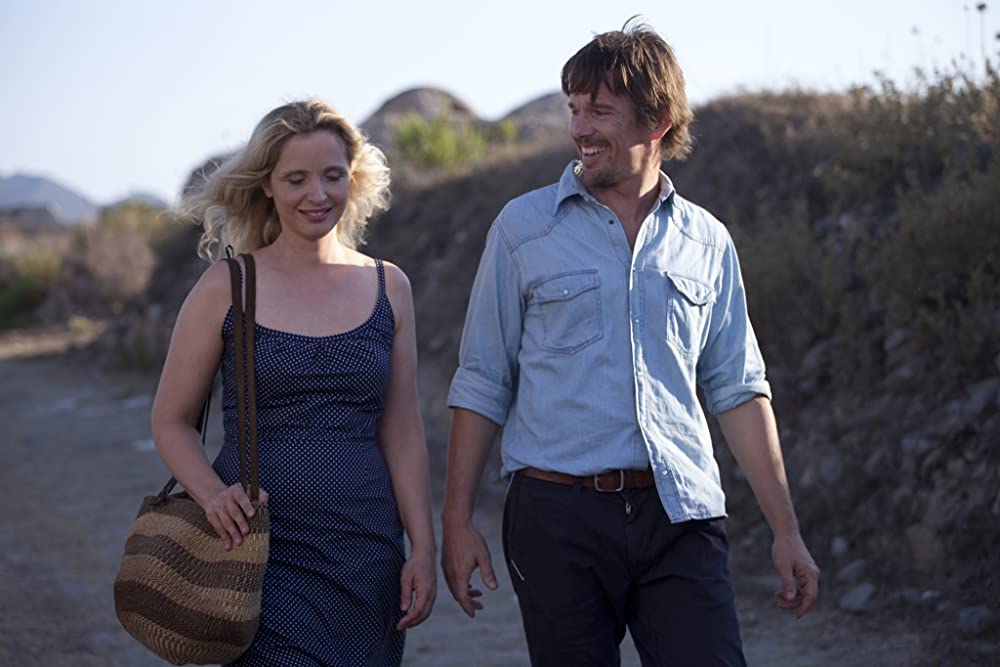
Before Midnight came out in 2013 to wrap this whole story up, and it took a very bold swing for a concluding chapter. Taking place nine years after Before Sunset, we see that Jesse and Céline decided to stay together and are now parents to twin girls. But Jesse has been unable to be close to his son from his previous marriage, and Céline is torn between her current career and a new opportunity.
Once again, the plot is kept minimal in favor of extended conversations revolving around our lovers’ lives, this time as they vacation in Greece. I really love how each film takes place in a different big city, keeping their scenery and production not only gorgeous, but visually distinct from one another. Yet they’re never very flashy, with cinematographers Lee Daniel (who did the first two films) and Christos Voudouris (who took over for Before Midnight) keeping us largely at the perspective of our characters.
The first two-thirds of Before Midnight play out generally how you might expect once you’re caught up on everything. Discussions about love are plentiful, this time with Jesse and Céline being in a long, committed relationship for the first time on screen. The script, once again a three-way effort between Linklater, Hawke, and Delpy, improves even further on the writing of the previous films. Linklater’s direction has also been perfected now, still keeping the pace of the dialogue relatively brisk while allowing for more room to absorb either the drama or levity of what’s being said.
As for the interactions themselves, they set you up to believe that after all Jesse and Céline have been through, they have the lives they wanted together with a relationship that’s aged well. Sure, there are imperfections and sacrifices that are brought up, but everything seems mostly good between them. If the film had stopped about halfway through, it would have been a totally serviceable way to end their story.
But even in these earlier scenes, there are slight hints of much darker emotions lurking underneath. They range from Jesse’s frustrations of not being close to his son, to Céline seeming like she’s being held back from her true potential, to their desires not quite meshing 100%. These signs are subtle, but they’re noticeable. And when they come to the surface, Before Midnight explodes into an almost completely different movie. Every negative emotion is laid painfully out in the open in a fierce, protracted argument that takes up pretty much the whole third act.
After two and a half films of such amicable interactions between two characters we’ve come to deeply root for, this sudden harsh shift is very rough to sit through. It’s the first time we see these two acting so bitter and almost hostile towards each other, with them saying things I never would have imagined them saying. It takes everything pure about their romance and all but completely tears it apart.
In doing so, Before Midnight recontextualizes the entire trilogy. Where the first film dealt with an exploration of young love and the second film dealt with regrets that come with not pursuing it, Before Midnight deals with regrets that come when you do pursue it. It takes the notion of revolving one’s life around another person and shows the long-term consequences that come after the initial payoffs. These ideas were brought up in the other films, but this is the first time we’re seeing them firsthand. And fittingly enough, this whole sequence takes place at night, adding literal darkness to such an ugly fight.
Hawke and Delpy give their best performances of the whole trilogy. They have to act through a much wider, much more difficult set of emotions than ever before. Even when they have their usual back-and-forth banter, they convey a subtle tinge of bitterness in their expressions and ways of communicating with each other that wasn’t there before.
Throughout the entire film, I was wondering if they seemed less happy than before, or if I was just imagining it due to them being a more seasoned couple this time. This is why the negativity near the end makes sense despite how sudden it is. The Before trilogy is an amazing showcase for both of these actors, and while Hawke has clearly seen notable success and recognition outside of the trilogy, I don’t understand why Delpy hasn’t enjoyed that same level of success when she clearly deserves it.
The final scene of Before Midnight leaves you with very mixed feelings. It’s not an outright downer, but it’s not the most uplifting ending either. You’re left to decide if what Jesse and Céline just experienced is something they’re going to overcome, whether it will be a permanent black stain on their relationship, or if they even still have a future. All you know is that all possible paths forward will bring them both fulfilment and pain at the same time.
THE FINAL TAKEAWAYS OF THE BEFORE TRILOGY
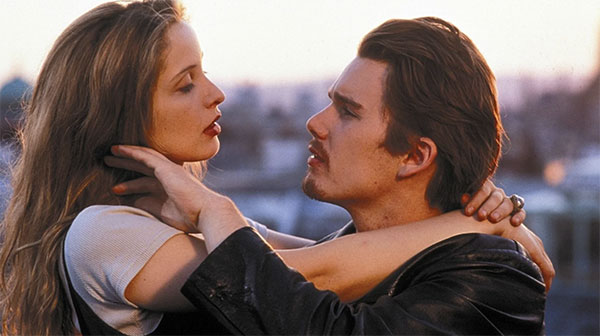
That duality between happiness and sorrow really is the entire central theme of the Before trilogy. Throughout all three movies, whether these two chose to be with each other or leave each other behind, their decisions always left a growing emptiness in both of them. They’ve had to come to grips with the fact that they’ll never find 100% happiness. It’s just a matter of which decisions will bring them the type of joy that’s worth the subsequent price. That’s a very risky note to end this trilogy on, but that risk pays off immensely and brings every major theme full circle.
Above all else, the Before trilogy is an examination of love, passion, sacrifice, and ambition, and how they always find ways to complicate life no matter how they’re tackled. You feel how much time has passed for these characters since their very first meeting, how much they’ve changed, and how much they’re left bearing the weight of the future and longevity in their minds. It’s also great to observe the evolution of the filmmaking and writing over nearly two decades, as it grows more assured of itself and develops a sharper sense of flow and realism.
The Before trilogy can also serve as a time capsule of the culture and landscape of each year in which these films take place, letting us observe, even if laterally, what’s changed over time and what’s remained the same. Whichever film you like most and however you interpret its central, dynamic relationship, the Before trilogy deserves to go down in history as one of the most assured, successful, and meaningful film trilogies of all time.
The Before Trilogy is now available to watch on digital, on demand, and on DVD and Blu-Ray. Read our article on Past Lives and the Meet-Cute Legacy of Before Sunrise!

